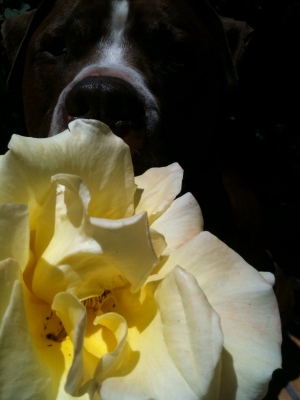A Treat By Any Other Name…

I have a pet peeve about dog training. Okay, actually I’ve got a few peeves about dog training; you caught me! I’m only going to mention one of them today though. It’s when people transpose the words “treat” and “reward” when talking about reinforcing a dog’s behavior. As in, “When the dog sits, give him a treat.” Or, “Reward the dog for not jumping up.”
Actually using either of the words above in a training scenario isn’t totally accurate; the word “reinforce” is the one that best suits the action and intention when acknowledging a dog’s correct response in an exercise in an attempt to increase the likelihood of a behavior.
Let’s look at the definitions of these words. All can be used as nouns or verbs; I’ve chosen the definitions of the words used as a noun, something you give to a dog.
A treat is used in a special occasion: “entertainment, food, drink, etc., given by way of compliment or as an expression of friendly regard.”
A reward is a prize or compensation of sorts: “something given or received in return or recompense for service, merit, hardship, etc.”
A reinforcement is a strengthening tool when applied to behavior or architecture: “something that reinforces, bolsters, or increases strength.”
You may think this is just semantics, but I believe words have weight and associations that color our interactions, and that the words we choose most definitely can affect our emotional state and perspective. The word you conjure in your mind when training and delivering reinforcement to your dog may influence whether you feel that you that you are:
a) “spoiling” your dog with treats, and perhaps losing your dog’s respect
b) awarding your dog a special honor simply for expected polite behavior
c) productively strengthening your dog’s correct response to your request in order to assure it happens more and more frequently, thus squeezing out any unwanted behavior in the process
See what I mean? How you view offering your dog a food morsel or favorite toy in exchange for what we deem “good” behavior (from a dog) totally impacts your interpretation of what dog training is, as well as how you view your relationship with your dog. So please choose your words wisely and by all means think about what your intention is when you offer your dog anything pleasant for good behavior.
Zak George of Animal Planet’s SuperFetch calls reinforcement “currency”, and I think that really works for some people because the image it conjures is one of dogs doing a job and earning their compensation, just like we do when we go to work. We aren’t bribed to do our jobs, and dogs shouldn’t be bribed into good behavior. Bribing breaks down the relationship and doesn’t work always work well in the long run. It certainly doesn’t utilize the desired cue as the precursor to the behavior. On the other hand, most of use aren’t physically forced to do our jobs against our will, and dogs shouldn’t be forced to do things either, especially when it’s so easy to teach them to want to do what we’d like them to do.
Personally, when I’m training, whether in a structured session or a real-life scenario, I know that most of the time I am reinforcing my dogs’ behavior when I feed or play with them for doing my bidding. Other times their behavior is so impressive, so stellar, that I instead choose to give them a big reward (which is still also reinforcement), especially when they are being perfect gentleman under difficult circumstances. I have no problem bestowing them with the equivalent of the canine World Cup when their performance is above and beyond. Finally, I give my dogs treats occasionally too. Big belly rubs or juicy marrow bones just because I love them and they are awesome dogs. No strings attached, because, after all that is what a treat is, a loving expression of friendly regard.




